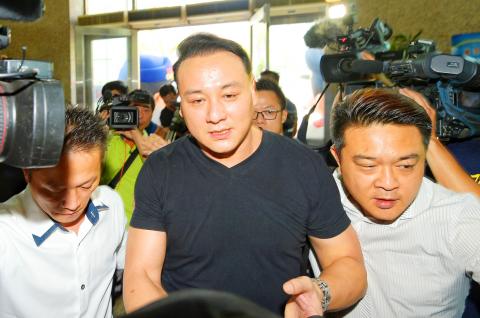Five members of the Chinese Unity Promotion Party (CUPP) were yesterday indicted for allegedly attacking and injuring several university students during protests at a music festival in September.
The “Sing! China: Shanghai-Taipei Music Festival,” a result of memorandums of understanding on cultural and arts events signed by Taipei and Shanghai in 2010 and 2014 respectively, was scheduled to run eight hours on Sept. 24 at National Taiwan University’s (NTU) athletic field in Taipei, but was canceled after two hours due to protests by students, who said the school failed to prioritize their right to use campus facilities.
Following the cancelation, three students were allegedly assaulted by CUPP members.

Photo: Chang Chia-ming, Taipei Times
The Taipei District Prosecutors’ Office yesterday indicted the five CUPP members on charges including assault resulting in injury, uttering threats and destruction of personal property.
The five included Chang Wei (張瑋), the second son of CUPP founder Chang An-le (張安樂), also known as the “White Wolf,” a former leader of the Bamboo Union gang who is known for supporting Taiwan’s unification with China.
The other four are Hu Ta-kang (胡大剛), Yang Shao-jui (楊紹瑞), Wang Shao-bin (王啟鑌) and Lin Shao-tse (林紹哲), who allegedly used metal rods to attack the students and protesters outside the music festival.
Prosecutors also indicted one protester, Lee Po-chang (李柏璋), who allegedly argued and fought with the CUPP members, causing facial injuries to Yang and breaking a pair of eyeglasses.
Lee, who is known for his outspoken pro-Taiwan independence views, has been nicknamed the “Machine Gun of Taiwanese Independence.”
Among the most severe casualties from the incident was NTU student Chang Keng-wei (張耿維), who was struck on the back of the head.
Investigators said that a video filmed by a bystander showed Hu approaching Chang Keng-wei from behind and striking him several times on the head and other parts of his body with a collapsible metal rod.
They added that the video showed Hu angrily confronting Lee’s girlfriend, who was filming the attack with her smartphone, telling her: “Don’t come any closer. If you do, I’ll hit you as well.”
Investigators said the video also shows Chang Wei apparently directing the attack by pointing with his hands and shouting instructions to CUPP members when they confronted the protesters outside the NTU campus.

The Taiwanese passport ranked 33rd in a global listing of passports by convenience this month, rising three places from last month’s ranking, but matching its position in January last year. The Henley Passport Index, an international ranking of passports by the number of designations its holder can travel to without a visa, showed that the Taiwan passport enables holders to travel to 139 countries and territories without a visa. Singapore’s passport was ranked the most powerful with visa-free access to 192 destinations out of 227, according to the index published on Tuesday by UK-based migration investment consultancy firm Henley and Partners. Japan’s and

NATIONAL SECURITY THREAT: An official said that Guan Guan’s comments had gone beyond the threshold of free speech, as she advocated for the destruction of the ROC China-born media influencer Guan Guan’s (關關) residency permit has been revoked for repeatedly posting pro-China content that threatens national security, the National Immigration Agency said yesterday. Guan Guan has said many controversial things in her videos posted to Douyin (抖音), including “the red flag will soon be painted all over Taiwan” and “Taiwan is an inseparable part of China,” while expressing hope for expedited “reunification.” The agency received multiple reports alleging that Guan Guan had advocated for armed reunification last year. After investigating, the agency last month issued a notice requiring her to appear and account for her actions. Guan Guan appeared as required,

Japan and the Philippines yesterday signed a defense pact that would allow the tax-free provision of ammunition, fuel, food and other necessities when their forces stage joint training to boost deterrence against China’s growing aggression in the region and to bolster their preparation for natural disasters. Japan has faced increasing political, trade and security tensions with China, which was angered by Japanese Prime Minister Sanae Takaichi’s remark that a Chinese attack on Taiwan would be a survival-threatening situation for Japan, triggering a military response. Japan and the Philippines have also had separate territorial conflicts with Beijing in the East and South China

A strong cold air mass is expected to arrive tonight, bringing a change in weather and a drop in temperature, the Central Weather Administration (CWA) said. The coldest time would be early on Thursday morning, with temperatures in some areas dipping as low as 8°C, it said. Daytime highs yesterday were 22°C to 24°C in northern and eastern Taiwan, and about 25°C to 28°C in the central and southern regions, it said. However, nighttime lows would dip to about 15°C to 16°C in central and northern Taiwan as well as the northeast, and 17°C to 19°C elsewhere, it said. Tropical Storm Nokaen, currently